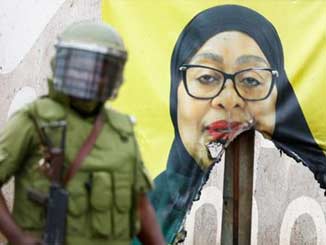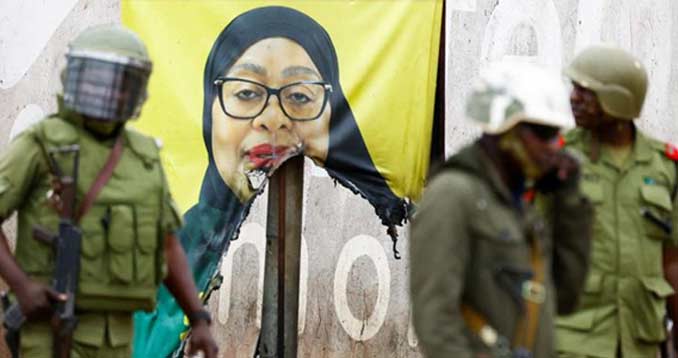

Tanzanians went to the polls on 29 October in an election dominated by the ruling Chama cha Mapinduzi (CCM) party, with the two main opposition presidential candidates, Tundu Lissu from Chadema (Chama cha Demokrasia na Maendeleo or the Party for Democracy and Progress), and Luhaga Mpina from ACT-Wazalendo, barred from standing. Verified videos showed protesters on the streets of Dar es Salaam, Mbeya, Tunduma, Tanga, and Mwanza among other towns.
Ahead of the elections, Amnesty International issued a briefing outlining how the Tanzanian authorities have intensified their repression of peaceful dissent against the opposition, journalists, human rights defenders, activists and civil society organizations.
In response to the internet shutdown by Tanzanian authorities following elections, Amnesty International’s Deputy Director for East and Southern Africa, Vongai Chikwanda said that
Amnesty International is particularly alarmed by reports that amidst the blackouts, security forces have used excessive force to suppress and disperse ongoing post-election protests, resulting in the deaths and injuries of protesters.
“This is the third time in less than a year that Tanzanian authorities have resorted to an internet blockade to silence dissenting voices. Authorities must immediately refrain from suppressing protests and instead respect, protect, and facilitate the right to peaceful assembly. They must immediately and unconditionally release all those arrested solely for exercising their right to peaceful assembly.”
“Authorities should promptly, thoroughly, independently, impartially, transparently and effectively investigate all killings by security agents and bring to justice in fair trials those suspected of being responsible. Authorities must also provide victims and their families with access to justice and effective remedies, says Chikwanda.
“The authorities must also allow both local and international media to freely report on the human rights situation in the country and refrain from restricting access to information, both online and offline including by immediately restoring internet access and access to basic public services. The ongoing restrictions are making it difficult to verify information, and to document election-related human rights violation,” says Chikwanda.
A new African Union report says the election failed to meet democratic standards, citing ballot stuffing, an internet blackout and politically motivated intimidation. The Southern African Development Community has issued similar criticism. President Samia Suluhu Hassan claimed victory with 98 percent of the vote in a largely unopposed race, while opposition leaders were barred or detained ahead of polling day.
Opposition party Chadema alleges hundreds were killed and buried in mass graves, claims the government denies. Meanwhile, opposition figures continue to face arrests, including terrorism charges against Chadema’s vice president John Heche.
During my visit to Tanzania, a week before the election, people seemed very dissatisfied with government and complained of corruption, contrary to the what the countries last president John Magufuli’s attempts to end corruption. The opposition to the government was pronounced in Zanzibar than the mainland.
